Module 12 Save our world Unit 3 Language in use课件(共45张PPT)
文档属性
| 名称 | Module 12 Save our world Unit 3 Language in use课件(共45张PPT) |
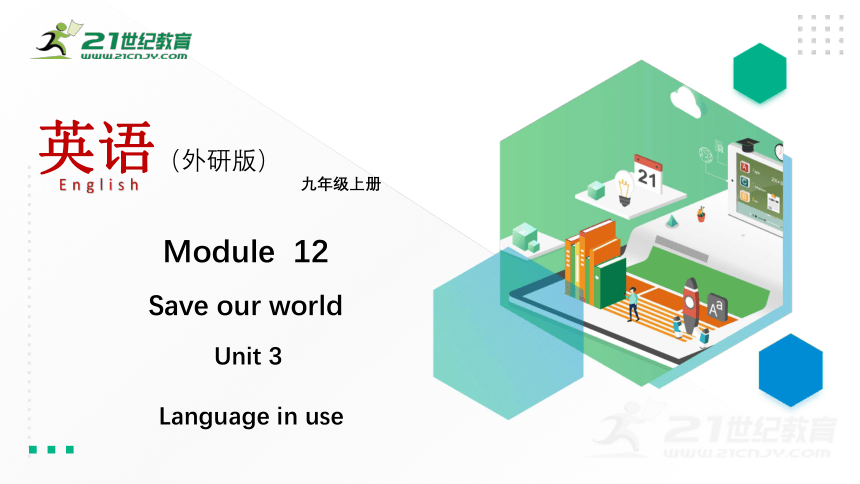
|
|
| 格式 | pptx | ||
| 文件大小 | 11.3MB | ||
| 资源类型 | 试卷 | ||
| 版本资源 | 外研版 | ||
| 科目 | 英语 | ||
| 更新时间 | 2021-10-11 13:57:05 | ||
图片预览

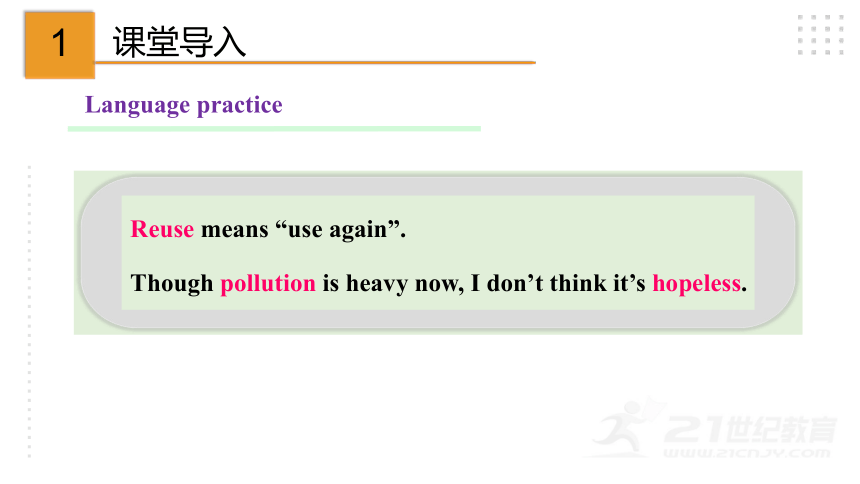
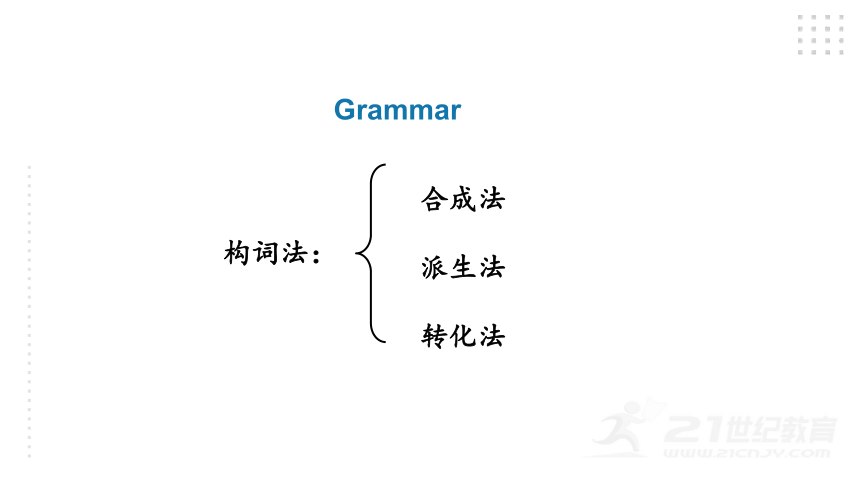
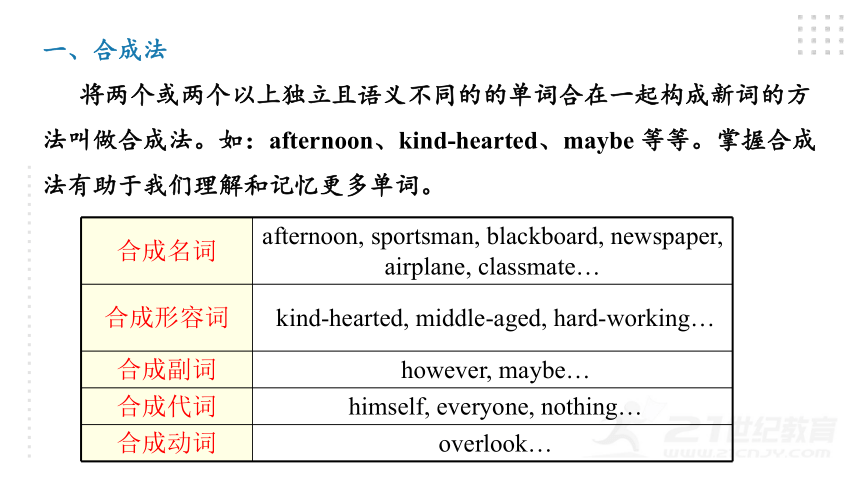
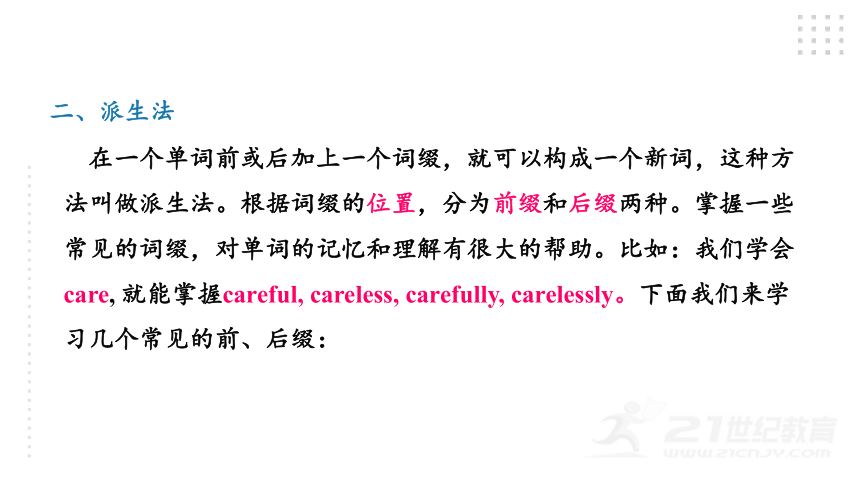
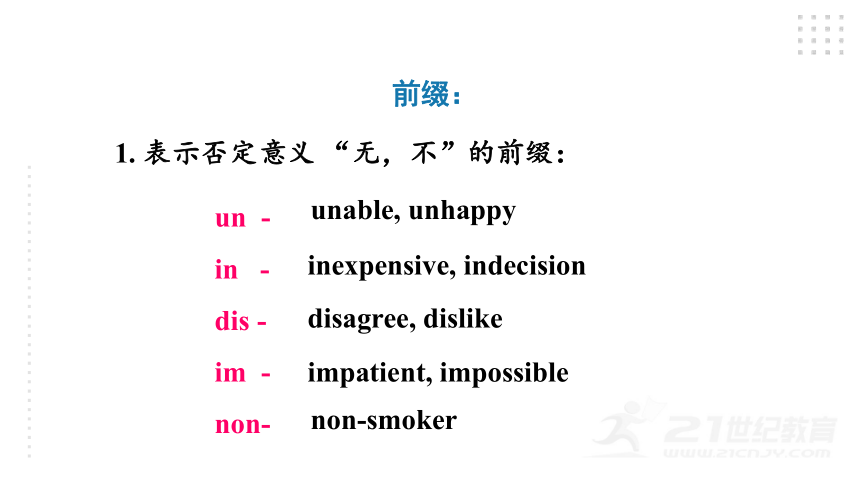
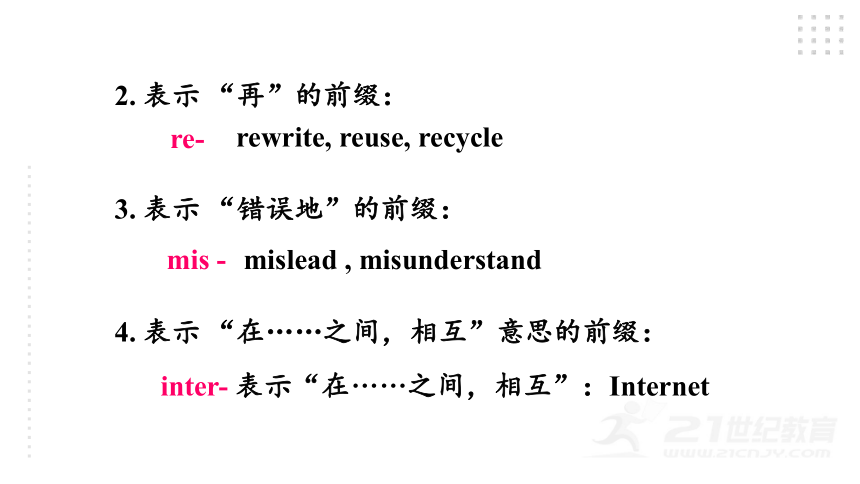
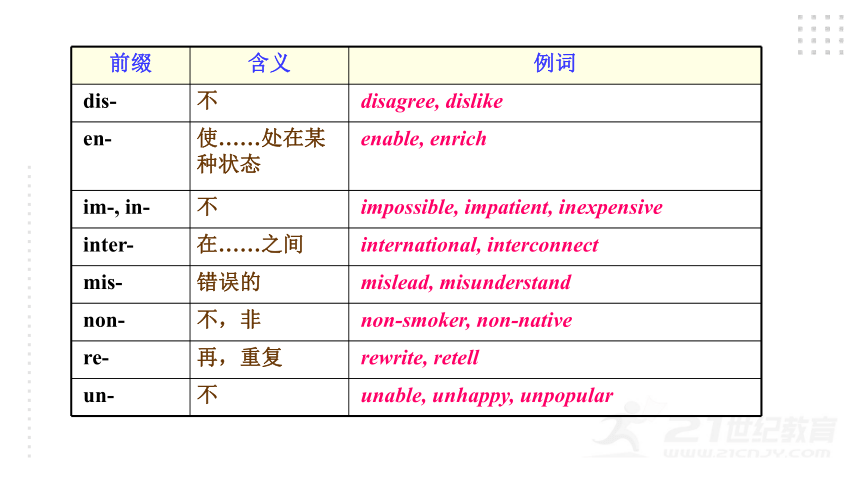
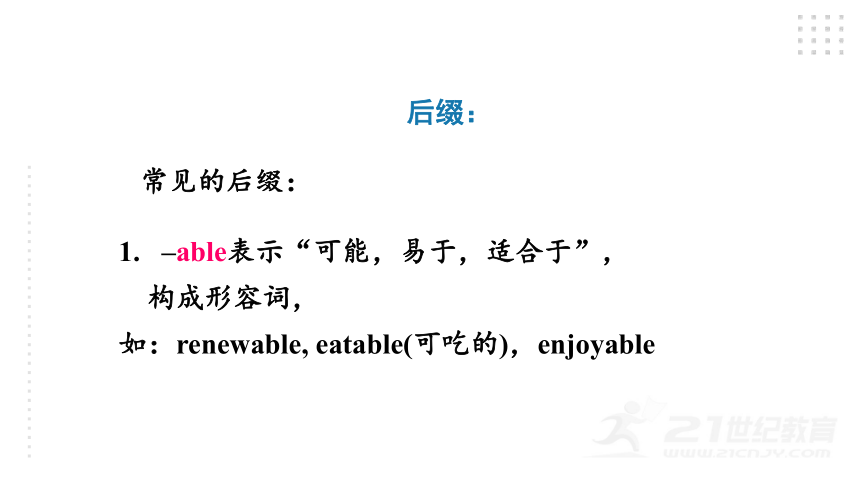
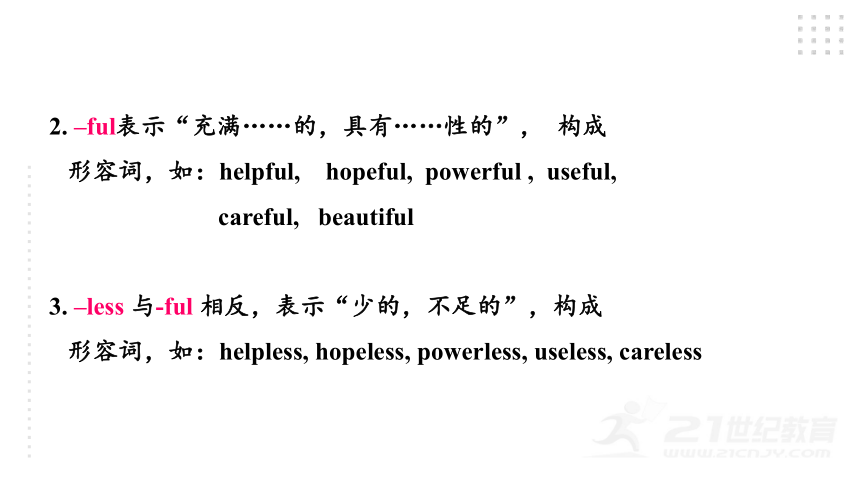
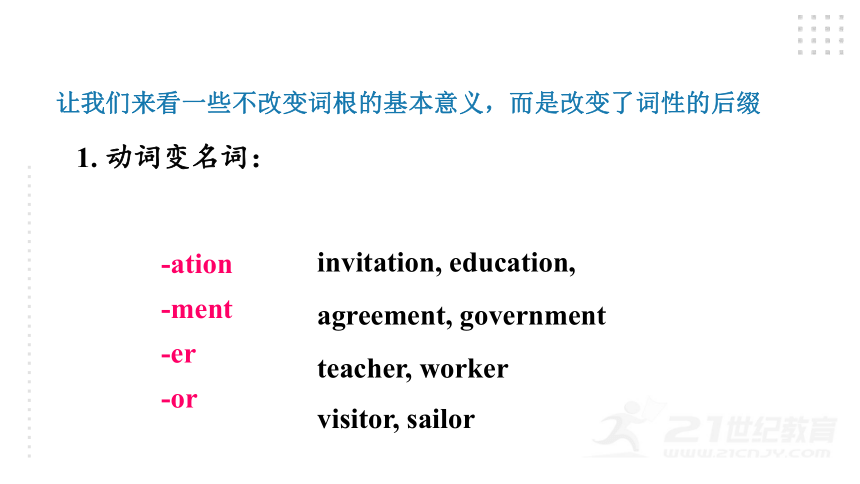
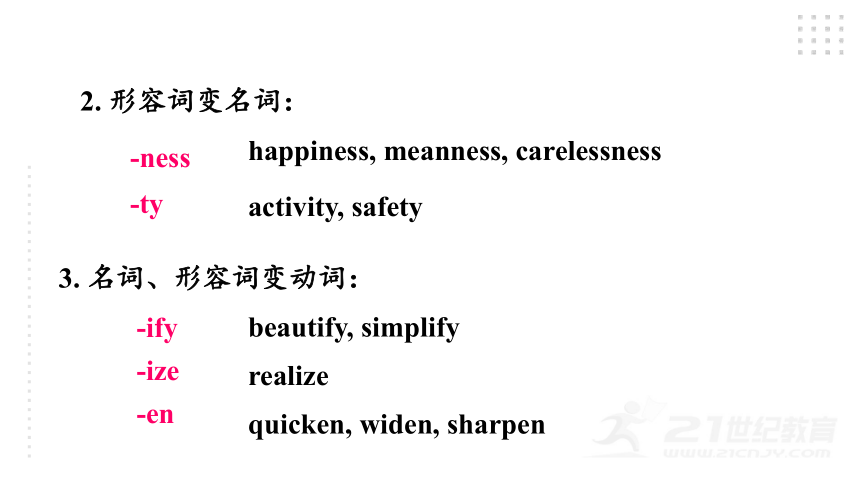
文档简介
(共45张PPT)
英语(外研版)
九年级上册
English
Module 12
Save our world
Unit 3
Language in use
Reuse means “use again”.
Though pollution is heavy now, I don’t think it’s hopeless.
Language practice
1
课堂导入
构词法:
合成法
派生法
转化法
Grammar
一、合成法
将两个或两个以上独立且语义不同的的单词合在一起构成新词的方法叫做合成法。如:afternoon、kind-hearted、maybe 等等。掌握合成法有助于我们理解和记忆更多单词。
合成名词 afternoon, sportsman, blackboard, newspaper, airplane, classmate…
合成形容词 kind-hearted, middle-aged, hard-working…
合成副词 however, maybe…
合成代词 himself, everyone, nothing…
合成动词 overlook…
在一个单词前或后加上一个词缀,就可以构成一个新词,这种方法叫做派生法。根据词缀的位置,分为前缀和后缀两种。掌握一些常见的词缀,对单词的记忆和理解有很大的帮助。比如:我们学会care, 就能掌握careful, careless, carefully, carelessly。下面我们来学习几个常见的前、后缀:
二、派生法
1. 表示否定意义 “无,不”的前缀:
impatient, impossible
un -
in -
dis -
im -
non-
unable, unhappy
inexpensive, indecision
disagree, dislike
non-smoker
前缀:
2. 表示 “再”的前缀:
re-
rewrite, reuse, recycle
3. 表示 “错误地”的前缀:
mis -
mislead , misunderstand
4. 表示 “在……之间,相互”意思的前缀:
inter- 表示“在……之间,相互”:Internet
前缀 含义 例词
dis- 不 disagree, dislike
en- 使……处在某种状态 enable, enrich
im-, in- 不 impossible, impatient, inexpensive
inter- 在……之间 international, interconnect
mis- 错误的 mislead, misunderstand
non- 不,非 non-smoker, non-native
re- 再,重复 rewrite, retell
un- 不 unable, unhappy, unpopular
后缀:
–able表示“可能,易于,适合于”,
构成形容词,
如:renewable, eatable(可吃的),enjoyable
常见的后缀:
2. –ful表示“充满……的,具有……性的”, 构成
形容词,如:helpful, hopeful, powerful , useful,
careful, beautiful
3. –less 与-ful 相反,表示“少的,不足的”,构成
形容词,如:helpless, hopeless, powerless, useless, careless
1. 动词变名词:
-ation
-ment
-er
-or
invitation, education,
agreement, government
teacher, worker
visitor, sailor
让我们来看一些不改变词根的基本意义,而是改变了词性的后缀
2. 形容词变名词:
-ness
-ty
happiness, meanness, carelessness
activity, safety
3. 名词、形容词变动词:
-ify
-ize
-en
beautify, simplify
realize
quicken, widen, sharpen
4. 名词变形容词:
-y
-ous
-ful
windy, rainy, sandy
dangerous, humorous
helpful, careful, peaceful
后缀 含义 例词
-er, -or 构成名词 teacher, worker, visitor
-ian musician
-ing building, painting, shopping
-ist artist, scientist
-ment agreement, government
-ness coldness, happiness, illness
-th truth, warmth
-tion competition, education, information
-ty activity, safety
后缀 含义 例词
-able, -ible 构成形容词 comfortable, eatable, enjoyable
-al environmental, international
-ful careful, helpful
-ive active, expensive
-less careless, helpless, homeless
-ly friendly, lovely, monthly
-ous dangerous, famous
-teen 构成数词 eighteen, fifteen, seventeen
-th fifteenth, fifth, fortieth
-ty forty, sixty, twenty
-ly 构成副词 badly, carefully, happily
英语构词法中把一种词性用作另一种词性而词形不变的方法叫做转换法。
三、转换法
动词转化为名词
— Let’s talk about it more.
— I think we’d better finish the talk now.
(2)名词转化为动词
— She gave me a cup of water.
— You should water the flowers twice a day.
(3)形容词转化为名词
— She was wearing a black dress.
— The girl in black looks very beautiful.
(黑衣服)
Make new words. Join the parts of words in Box A with the words in Box B. You need to use some of the parts more than once.
-able -ful im- -less re- un-
A
B
care collect hope possible use
usual wanted waste
2
课堂活动
01
Now work in groups. Play the guessing game English for Fun.
1 full of care __________
2 can be collected __________
3 full of hope __________
4 without any hope _________
careful
English for Fun
collectable
hopeful
hopeless
5 not possible __________
6 not usual __________
7 without any use __________
8 use again __________
9 not wanted __________
10 making a lot of waste __________
useless
impossible
wasteful
unusual
reuse
unwanted
Learning to learn
Sometimes if you know the meaning of the parts of a word, you can work out the meaning of the whole word. re+ new+ able: re= again, able=can be
renewable=can be new again
Complete the sentences with the words in the box.
hopeful impossible reuse unhealthy wasteful
1 Polluted water is _____________.
2 It is ____________ to throw so much food away.
unhealthy
wasteful
3 If you look after things well, you may ______ some of them later.
4 It is ___________ to clean up the whole river in such a short time.
5 If we pay attention to pollution now, the future will be ___________.
reuse
impossible
hopeful
02
Complete the table.
Noun Verb Adjective Adverb
useful/useless
hope hopefully/hopelessly
pollution —
use
use
usefully/uselessly
hope
hopeful/hopeless
pollute
polluted/unpolluted
03
Noun Verb Adjective Adverb
water — —
waste
— — usually/unusually
water
waste
wasteful/
wasted
wastefully
usual/
unusual
Complete the sentences with the correct form of the words in Activity 3.
She was ___________ that her new job would make her more successful.
hopeful
The factory _________ the river, and the fish died.
polluted
We often walk in the countryside . It is a (n) __________ activity
for us.
3. Do not use so much water. It is very _________.
4. To keep the flowers growing, you need to ________them once a day.
water
wasteful
usual/useful
04
Complete the sentences.
A _________ is a box that you keep your lunch in.
lunchbox
A ____________ is a card that you write on one side of and send to someone by post.
2 A __________ is a room where you have classes at school.
classroom
postcard
3 A ___________ is a book that has one or more stories for children.
4 A ____________ is a black board that is used at school for writing on with chalk.
blackboard
storybook
05
Work in pairs. Look at the pictures and answer the questions.
1 What kinds of things can be recycled
2 How can these things be reused
3 How does this help the environment
4 Have you ever recycled or used things
that can be recycled How
06
Complete the conversation with the correct form of the expressions in the box.
be good for throw away turn off worry about
I hear you are off to the Caribbean for a holiday! Lucky you! But aren’t you (1) _______________the pollution that such long plane journeys may cause for the environment
worried about
Mike:
07
I know, but what can I do about it I’ve already tried my best to protect the environment. I recycle. I don’t (2) __________ things if I don’t want them any more. I (3)_________the lights when I leave a room. Don’t tell me I shouldn’t travel by plane any more!
throw away
turn off
Ken:
Mike:
No, of course not. But we can do more to protect the environment. For example, we can help keep the air clean by planting trees. Trees (4)____________the environment. In this way, we can reduce the harm of pollution.
are good for
Good! So I can enjoy my holiday, and when I come back, I’ll plant some trees!
That’s the idea! Maybe we can all
join in and start a small forest!
Ken:
Mike:
Listen and check (√) the true sentences.
It’s OK to throw used things away. Looking after them takes a lot of time. □
Do not throw away things made of glass, plastic and paper, but recycle them when possible. □
Take a bag when you go shopping. □
√
√
08
Producing electricity and using oil will not cause pollution. □
5. Turn off lights when you do not need them. □
6. Ride a bike or walk, and do not often drive your car. □
√
√
Advice Reasons
1. Don’t throw away things made of ____________________, but_______ them. Throwing things away is wasteful.
2. ______ your plastic bags when you can and __________ with you when you go shopping. Plastic bags ____________ recycle.
3. Use less electricity and oil to ___________. 4. Don’t leave lights on and ____________. 5. _____________ and do not often drive your car. Producing electricity and using oil may cause ____________.
glass, plastic and paper
recycle
Reuse
take a bag
are hard to
reduce pollution
waste electricity
Walk or cycle
pollution
Listen again and complete the table.
09
Reuse and recycle
It’s a waste to throw used things away. Don’t throw away things made of glass, plastic and paper, but recycle them if possible. Plastic bags are hard to recycle, so reuse the old ones when you can. Take a bag with you when you go shopping.
Tapescript
Reduce pollution
Producing electricity and using oil may cause pollution of the air, water and earth in many different ways. If we use less electricity and oil, we can reduce pollution. Here is some advice: don’t leave lights on and waste electricity; walk or cycle, and don’t drive a car unless you have to. Walking and cycling are good for your health too!
Earth Hour
Earth Hour is held toward the end of March each year. During Earth Hour, people all across the world switch off the lights they do not need. They do this to show their awareness of climate change.
The first Earth Hour was held in 2007 in Sydney, where more than 2.2 million people switched off their lights. Today, more and more cities are taking part in the event, such as Beijing, London, Rome and New York, and landmarks like the Empire State Building and the Golden Gate Bridge will go dark.
Module task: Discussing what you can do about pollution
Work in groups. Decide what kind of pollution you want to talk about.
Choose a subject that you care about the most. It could be water pollution, air pollution, etc.
Find out more information about your subject. Look it up on a website or in a books.
10
Discuss your subject.
Take turns to say what you think about the problem
and what can be done.
Listen to what others say. If you agree with what they have said, say “I agree”, “That’s true” or “That’s a good point”; if you do not agree with what someone says , say “I’m sorry, but I don’t agree. I think that ...”
11
Present your group’s ideas to the whole class.
12
Possible answer
Yes, I agree with you that air pollution is one of the most serious problems. A great deal of energy is needed to run the factories of modern industrial nations. Automobile, trains, planes and busses need energy, too. Nearly all of this energy is produced by burning fuels. The burning produces wastes, some of which remain in the air, causing air pollution.
Scientists are finding ways to stop air pollution especially in big industrial areas and densely-populated cities. They are studying new ways of generating electricity that may be less damaging to the environment. At the same time, many power plants are being modernized to give off less polluted material. Also, engineers try to design and locate new power plants to do minimum damage to the environment.
However, it may be that we still have a long way to go before we have a "clean" world. Nearly all of the countries are trying hard to prevent and control air pollution. There indeed
seems to be no end to tasks that environmentalists will be required to do. People will continually find new ways to control pollution.
3
课堂小结
1. We have learned word building: compounds , derivatives, conversion.
2. We have learned to write an article about environment.
一、用所给单词的适当形式填空。
1. We should give up those _________ (waste) habit in order to save our world.
2. Some factories________ (cause) pollution.
3. I think _____________ (environment) education for kids is necessary.
4. Most students on our school often collect________ (reuse) waste for recycling.
5. If we don’t look after our earth well, the future will be _________ (hope).
wasteful
cause
environmental
reusable
hopeless
4
课堂练习
二、按要求完成下列句子。
1. It’s not polite to speak to others with your mouth full of food.
It’s _________ to speak to others with your mouth full of food.
2. The teacher asked him to write the composition again.
The teacher asked him to _________ the composition.
3. He’s not popular with some of the neighbors.
He’s _________ with some of the neighbors.
4. I hate sweet food. Especially, I don’t like eating cake.
I hate sweet food. Especially, I _________ eating cake.
5. Hamburgers, candy and ice cream aren’t healthy food.
Hamburgers, candy and ice cream are __________ food.
impolite
rewrite
unpopular
dislike
unhealthy
https://www.21cnjy.com/help/help_extract.php
英语(外研版)
九年级上册
English
Module 12
Save our world
Unit 3
Language in use
Reuse means “use again”.
Though pollution is heavy now, I don’t think it’s hopeless.
Language practice
1
课堂导入
构词法:
合成法
派生法
转化法
Grammar
一、合成法
将两个或两个以上独立且语义不同的的单词合在一起构成新词的方法叫做合成法。如:afternoon、kind-hearted、maybe 等等。掌握合成法有助于我们理解和记忆更多单词。
合成名词 afternoon, sportsman, blackboard, newspaper, airplane, classmate…
合成形容词 kind-hearted, middle-aged, hard-working…
合成副词 however, maybe…
合成代词 himself, everyone, nothing…
合成动词 overlook…
在一个单词前或后加上一个词缀,就可以构成一个新词,这种方法叫做派生法。根据词缀的位置,分为前缀和后缀两种。掌握一些常见的词缀,对单词的记忆和理解有很大的帮助。比如:我们学会care, 就能掌握careful, careless, carefully, carelessly。下面我们来学习几个常见的前、后缀:
二、派生法
1. 表示否定意义 “无,不”的前缀:
impatient, impossible
un -
in -
dis -
im -
non-
unable, unhappy
inexpensive, indecision
disagree, dislike
non-smoker
前缀:
2. 表示 “再”的前缀:
re-
rewrite, reuse, recycle
3. 表示 “错误地”的前缀:
mis -
mislead , misunderstand
4. 表示 “在……之间,相互”意思的前缀:
inter- 表示“在……之间,相互”:Internet
前缀 含义 例词
dis- 不 disagree, dislike
en- 使……处在某种状态 enable, enrich
im-, in- 不 impossible, impatient, inexpensive
inter- 在……之间 international, interconnect
mis- 错误的 mislead, misunderstand
non- 不,非 non-smoker, non-native
re- 再,重复 rewrite, retell
un- 不 unable, unhappy, unpopular
后缀:
–able表示“可能,易于,适合于”,
构成形容词,
如:renewable, eatable(可吃的),enjoyable
常见的后缀:
2. –ful表示“充满……的,具有……性的”, 构成
形容词,如:helpful, hopeful, powerful , useful,
careful, beautiful
3. –less 与-ful 相反,表示“少的,不足的”,构成
形容词,如:helpless, hopeless, powerless, useless, careless
1. 动词变名词:
-ation
-ment
-er
-or
invitation, education,
agreement, government
teacher, worker
visitor, sailor
让我们来看一些不改变词根的基本意义,而是改变了词性的后缀
2. 形容词变名词:
-ness
-ty
happiness, meanness, carelessness
activity, safety
3. 名词、形容词变动词:
-ify
-ize
-en
beautify, simplify
realize
quicken, widen, sharpen
4. 名词变形容词:
-y
-ous
-ful
windy, rainy, sandy
dangerous, humorous
helpful, careful, peaceful
后缀 含义 例词
-er, -or 构成名词 teacher, worker, visitor
-ian musician
-ing building, painting, shopping
-ist artist, scientist
-ment agreement, government
-ness coldness, happiness, illness
-th truth, warmth
-tion competition, education, information
-ty activity, safety
后缀 含义 例词
-able, -ible 构成形容词 comfortable, eatable, enjoyable
-al environmental, international
-ful careful, helpful
-ive active, expensive
-less careless, helpless, homeless
-ly friendly, lovely, monthly
-ous dangerous, famous
-teen 构成数词 eighteen, fifteen, seventeen
-th fifteenth, fifth, fortieth
-ty forty, sixty, twenty
-ly 构成副词 badly, carefully, happily
英语构词法中把一种词性用作另一种词性而词形不变的方法叫做转换法。
三、转换法
动词转化为名词
— Let’s talk about it more.
— I think we’d better finish the talk now.
(2)名词转化为动词
— She gave me a cup of water.
— You should water the flowers twice a day.
(3)形容词转化为名词
— She was wearing a black dress.
— The girl in black looks very beautiful.
(黑衣服)
Make new words. Join the parts of words in Box A with the words in Box B. You need to use some of the parts more than once.
-able -ful im- -less re- un-
A
B
care collect hope possible use
usual wanted waste
2
课堂活动
01
Now work in groups. Play the guessing game English for Fun.
1 full of care __________
2 can be collected __________
3 full of hope __________
4 without any hope _________
careful
English for Fun
collectable
hopeful
hopeless
5 not possible __________
6 not usual __________
7 without any use __________
8 use again __________
9 not wanted __________
10 making a lot of waste __________
useless
impossible
wasteful
unusual
reuse
unwanted
Learning to learn
Sometimes if you know the meaning of the parts of a word, you can work out the meaning of the whole word. re+ new+ able: re= again, able=can be
renewable=can be new again
Complete the sentences with the words in the box.
hopeful impossible reuse unhealthy wasteful
1 Polluted water is _____________.
2 It is ____________ to throw so much food away.
unhealthy
wasteful
3 If you look after things well, you may ______ some of them later.
4 It is ___________ to clean up the whole river in such a short time.
5 If we pay attention to pollution now, the future will be ___________.
reuse
impossible
hopeful
02
Complete the table.
Noun Verb Adjective Adverb
useful/useless
hope hopefully/hopelessly
pollution —
use
use
usefully/uselessly
hope
hopeful/hopeless
pollute
polluted/unpolluted
03
Noun Verb Adjective Adverb
water — —
waste
— — usually/unusually
water
waste
wasteful/
wasted
wastefully
usual/
unusual
Complete the sentences with the correct form of the words in Activity 3.
She was ___________ that her new job would make her more successful.
hopeful
The factory _________ the river, and the fish died.
polluted
We often walk in the countryside . It is a (n) __________ activity
for us.
3. Do not use so much water. It is very _________.
4. To keep the flowers growing, you need to ________them once a day.
water
wasteful
usual/useful
04
Complete the sentences.
A _________ is a box that you keep your lunch in.
lunchbox
A ____________ is a card that you write on one side of and send to someone by post.
2 A __________ is a room where you have classes at school.
classroom
postcard
3 A ___________ is a book that has one or more stories for children.
4 A ____________ is a black board that is used at school for writing on with chalk.
blackboard
storybook
05
Work in pairs. Look at the pictures and answer the questions.
1 What kinds of things can be recycled
2 How can these things be reused
3 How does this help the environment
4 Have you ever recycled or used things
that can be recycled How
06
Complete the conversation with the correct form of the expressions in the box.
be good for throw away turn off worry about
I hear you are off to the Caribbean for a holiday! Lucky you! But aren’t you (1) _______________the pollution that such long plane journeys may cause for the environment
worried about
Mike:
07
I know, but what can I do about it I’ve already tried my best to protect the environment. I recycle. I don’t (2) __________ things if I don’t want them any more. I (3)_________the lights when I leave a room. Don’t tell me I shouldn’t travel by plane any more!
throw away
turn off
Ken:
Mike:
No, of course not. But we can do more to protect the environment. For example, we can help keep the air clean by planting trees. Trees (4)____________the environment. In this way, we can reduce the harm of pollution.
are good for
Good! So I can enjoy my holiday, and when I come back, I’ll plant some trees!
That’s the idea! Maybe we can all
join in and start a small forest!
Ken:
Mike:
Listen and check (√) the true sentences.
It’s OK to throw used things away. Looking after them takes a lot of time. □
Do not throw away things made of glass, plastic and paper, but recycle them when possible. □
Take a bag when you go shopping. □
√
√
08
Producing electricity and using oil will not cause pollution. □
5. Turn off lights when you do not need them. □
6. Ride a bike or walk, and do not often drive your car. □
√
√
Advice Reasons
1. Don’t throw away things made of ____________________, but_______ them. Throwing things away is wasteful.
2. ______ your plastic bags when you can and __________ with you when you go shopping. Plastic bags ____________ recycle.
3. Use less electricity and oil to ___________. 4. Don’t leave lights on and ____________. 5. _____________ and do not often drive your car. Producing electricity and using oil may cause ____________.
glass, plastic and paper
recycle
Reuse
take a bag
are hard to
reduce pollution
waste electricity
Walk or cycle
pollution
Listen again and complete the table.
09
Reuse and recycle
It’s a waste to throw used things away. Don’t throw away things made of glass, plastic and paper, but recycle them if possible. Plastic bags are hard to recycle, so reuse the old ones when you can. Take a bag with you when you go shopping.
Tapescript
Reduce pollution
Producing electricity and using oil may cause pollution of the air, water and earth in many different ways. If we use less electricity and oil, we can reduce pollution. Here is some advice: don’t leave lights on and waste electricity; walk or cycle, and don’t drive a car unless you have to. Walking and cycling are good for your health too!
Earth Hour
Earth Hour is held toward the end of March each year. During Earth Hour, people all across the world switch off the lights they do not need. They do this to show their awareness of climate change.
The first Earth Hour was held in 2007 in Sydney, where more than 2.2 million people switched off their lights. Today, more and more cities are taking part in the event, such as Beijing, London, Rome and New York, and landmarks like the Empire State Building and the Golden Gate Bridge will go dark.
Module task: Discussing what you can do about pollution
Work in groups. Decide what kind of pollution you want to talk about.
Choose a subject that you care about the most. It could be water pollution, air pollution, etc.
Find out more information about your subject. Look it up on a website or in a books.
10
Discuss your subject.
Take turns to say what you think about the problem
and what can be done.
Listen to what others say. If you agree with what they have said, say “I agree”, “That’s true” or “That’s a good point”; if you do not agree with what someone says , say “I’m sorry, but I don’t agree. I think that ...”
11
Present your group’s ideas to the whole class.
12
Possible answer
Yes, I agree with you that air pollution is one of the most serious problems. A great deal of energy is needed to run the factories of modern industrial nations. Automobile, trains, planes and busses need energy, too. Nearly all of this energy is produced by burning fuels. The burning produces wastes, some of which remain in the air, causing air pollution.
Scientists are finding ways to stop air pollution especially in big industrial areas and densely-populated cities. They are studying new ways of generating electricity that may be less damaging to the environment. At the same time, many power plants are being modernized to give off less polluted material. Also, engineers try to design and locate new power plants to do minimum damage to the environment.
However, it may be that we still have a long way to go before we have a "clean" world. Nearly all of the countries are trying hard to prevent and control air pollution. There indeed
seems to be no end to tasks that environmentalists will be required to do. People will continually find new ways to control pollution.
3
课堂小结
1. We have learned word building: compounds , derivatives, conversion.
2. We have learned to write an article about environment.
一、用所给单词的适当形式填空。
1. We should give up those _________ (waste) habit in order to save our world.
2. Some factories________ (cause) pollution.
3. I think _____________ (environment) education for kids is necessary.
4. Most students on our school often collect________ (reuse) waste for recycling.
5. If we don’t look after our earth well, the future will be _________ (hope).
wasteful
cause
environmental
reusable
hopeless
4
课堂练习
二、按要求完成下列句子。
1. It’s not polite to speak to others with your mouth full of food.
It’s _________ to speak to others with your mouth full of food.
2. The teacher asked him to write the composition again.
The teacher asked him to _________ the composition.
3. He’s not popular with some of the neighbors.
He’s _________ with some of the neighbors.
4. I hate sweet food. Especially, I don’t like eating cake.
I hate sweet food. Especially, I _________ eating cake.
5. Hamburgers, candy and ice cream aren’t healthy food.
Hamburgers, candy and ice cream are __________ food.
impolite
rewrite
unpopular
dislike
unhealthy
https://www.21cnjy.com/help/help_extract.php
同课章节目录
- Module 1 Wonders of the world
- Unit 1 It's more than 2,000 years old.
- Unit 2 The Grand Canyon was not just big.
- Unit 3 Language in use
- Module 2 Public holidays
- Unit 1 My family always go somewhere interesting a
- Unit 2 We have celebrated the festival since the f
- Unit 3 Language in use
- Module 3 Heroes
- Unit 1 She trained hard,so she became a great play
- Unit 2There were few doctors, so he had to work ve
- Unit 3 Language in use
- Module 4 Home alone
- Unit 1 I can look after myself, although it won’t
- Unit 2 I became so bored with their orders that I
- Unit 3 Language in use
- Module 5 Museums
- Unit 1 Don't cross that rope!
- Unit 2 If you ever go to London, make sure you vis
- Unit 3 Language in use
- Module 6 Problems
- Unit 1 If I start after dinner, I'll finish it be
- Unit 2 If you tell him the truth now, you will sho
- Unit 3 Language in use
- Revision Module A
- Module 7 Great books
- Unit 1 We're still influenced by Confucius's idea
- Unit 2 It is still read and loved.
- Unit 3 Language in use
- Module 8 Sports life
- Unit 1 Daming wasn't chosen for the team last time
- Unit 2 He was invited to competitions around the w
- Unit 3 Language in use
- Module 9 Great inventions
- Unit 1 Will computers be used more than books in t
- Unit 2 Will books be replaced by the Internet?
- Unit 3 Language in use
- Module 10 Australia
- Unit 1 I have some photos that I took in Australia
- Unit 2 The game that they like most is Australian
- Unit 3 Language in use
- Module 11 Photos
- Unit 1 He's the boy who won the photo competition
- Unit 2 The photo which we liked best was taken by
- Unit 3 Language in use
- Module 12 Save our world
- Unit 1 If everyone starts to do something, the wor
- Unit 2 Repeat these three words daily: reduce, reu
- Unit 3 Language in use
- Revision Module B
